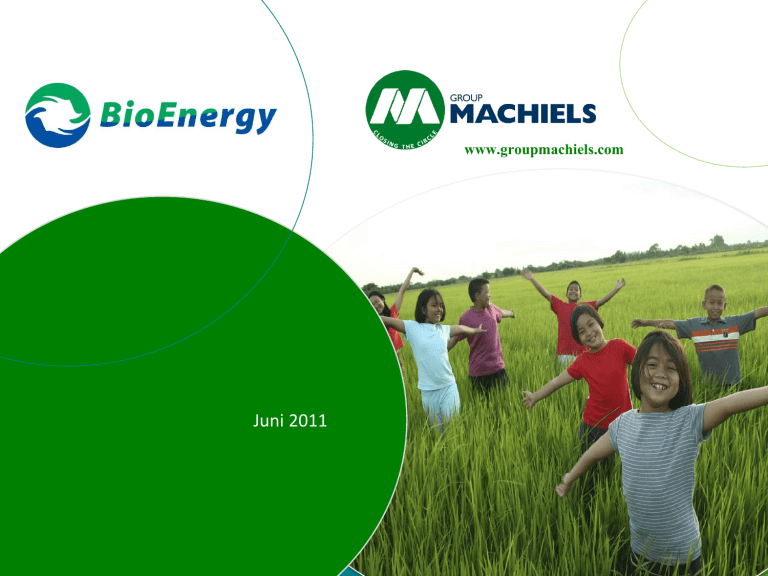
www.groupmachiels.com
Juni 2011
Agenda
GROUP MACHIELS
BIO ENERGY: Biomassa als energiebron
CONCLUSIE
Group Machiels Anno 2011
Familiebedrijf, actief sinds 1941 en nu al de
3e generatie Machiels.
Group Machiels ziet zichelf al jaren als een pionier in duurzaamheid. De interne
know how en dynamiek resulteren in geävanceerde technieken in groeneenergieproductie, recyclage en de valorizatie van afvalstoffen.
Aanwezig in 7 landen (België, Frankrijk, Argentinië, Vietnam, Chili, Zuid-Afrika,
Ethiopië)
Alle know how die voortvloeit uit deze activiteiten wordt gecentraliseerd in het
hoofdkantoor in Hasselt en wordt wereldwijd verspreid.
STRUCTUUR per ACTIVITEIT
Afvalopslag
Industrieel
Bouwcomponenten
Gezondheidssector
Afvalbehandeling
Residentieel
Bouwoplossingen
Biotechnologie
Afvalrecyclage
Logistiek
Energie
uit zon
Energie uit
wind
Energie uit
biomassa
GEOGRAPHISCHE STRUCTUUR
GROUP MACHIELS
CORPORATE
ZUIDAMERIKA
EUROPA
Chili
België
Argentinië
Polen
Rusland
Roemenië
AZIE
Vietnam
AFRIKA
ZuidAfrika
Ethiopië
MIDDENOOSTEN
Dubai
Milieu & Energie
Vastgoed
Machiels Building Solutions
Diversificaties
BetaCell
Patrona Pharma
Senior Assist
Agenda
GROUP MACHIELS
BIO ENERGY: Biomassa als energiebron
CONCLUSIE
OVERZICHT PROCES BIO-ENERGY
AFVALSTROMEN
Anaerobe vergister
Afval Farm Frites
(80%)
Vorming biogas
(CH4 , CO2 , H2O)
Andere costromen
(20%)
Gasballon
WKK motoren
Koelen
biogas
Opslag
biogas
Omvorming biogas
in elektriciteit en
warmte
(3,7 MW)
biogas
Centrifuge
Compressoren
Elektriciteit
Stoom
Heet water
Gasfakkel
Polymeer 488
Ontwatering
digestaat
Vaste fractie =
bodemverbeteraar
Centraat
CENTRAAT
Waterige fractie van
digestaat, vervuild met:
H2SO4
Decarbonatatie
• CO32-= carbonaat
• NH3= ammoniak
• Organische stikstof
• PO43-= fosfaat
• Mineralen =zouten=ionen
Uitstroom (=effluent)
decarbonatatie
= lime softener
Polymeer 2299
Kalkmelk
FeCl3
Ammoniakstripper
Absorber
Verwijdering
ammoniak
Neerslaan
ammonium
Water vervuild met:
Verwijdering
koolzuurgas en
carbonaten
• CO2= koolzuurgas
• NH3= ammoniak
• Organische stikstof
• PO43-= fosfaat
• Mineralen
=zouten=ionen
Ammoniumsulfaat
= kunstmest
Uitstroom stripper
Beluchtingstank
Uitstroom stripper
RO
MBR
PERMEAAT
Water vervuild met:
• Organische stikstof
• PO43-= fosfaat
• Mineralen
=zouten=ionen
ENERGIE
Opmengen
vergister
Digestaat
DIGESTAAT
Slib met
restmateriaal uit
anaerobe
vergister
Gasbehandeling
TANK
54
Verwijdering organische
stikstof en fosfaten
Water vervuild met:
• Mineralen
=zouten=ionen
Polymeer 488
FeCl3
H2SO4
MBR-slib
Hoge druk
Polisher
Verwijdering
mineralen
Zuiver Water
(WKK motoren)
MBR centrifuge
Ontwateren
MBR-slib
Waterige fractie MBR-slib
Vaste fractie =
bodemverbeteraar
BioEnergy
• Closed Circle
- from potato waste to green electricity,
biological fertiliser and purified water
• Activities
- treatment of vegetable biomass waste
- production of green electricity
- process water treatment
• Location
Lommel – Belgium
BioEnergy – mass and energy balance
• Input
-150.000 ton/year biomass waste with 13,5% dry matter
• Output
- Green electricity 34.000 tot 46.000 MWh/year
- Green heat 21.000 tot 28.000 MWth/year in overheated
water
16.000 tot 21.000 MWth/year in steam
- Process water 90.000 m³ /year
- Drain water 30.000 m³/year
-Solid rest fraction 20.000 ton/year
BioEnergy – Unit processes
• Homogenization & thermophilic fermentation
• Solid – liquid separation
• Decarbonation
• Ammonia srtripping
• Membrane bioreator
• Reverse Osmosis
• Cogeneration
BioEnergy – homogenization & fermentation
Capacity :
2 x 5000 m3
Feed rate :
17,2 t/h
Loading rate :
max. 5kg VS/m3d
Output
Dry mass :
3,9 %
VS :
2,5 %
COD out :
15,5g/l
BioEnergy – Solid – Liquid separation
Dewatered Digestate
Volume :
65t/d
TS :
20 %
MBR+ lime sludge
Volume :
24 t/d
TS :
25-30 %
BioEnergy - Decarbonation
Ca en Mg removal
P-removal
NH4+ conversion to NH3
PH :
Temperature :
TSS sludge :
11
50°C
150 g/l
BioEnergy – Ammonia stripping
NH3-removal
NH3 in :
Removal effeciency :
(NH4) 2SO4
Concentration :
Volume :
35 %
4,8 t/d
1600 mg/l
90 %
BioEnergy – Membrane based bio-reactor
Removal of BOD and solid particles
Membrane :
Flux :
Aeration tank :
Sludge loading rate :
Zeeweed 500
< 9 l/m2h
2500 m3
< 0,1 BOD/kg MLSS
BioEnergy – Reverse Osmosis
Removal of salts
Type : double pass
Membrane :
TDS in :
Permeate :
TOC out :
Net permeate flow :
Net concentrate flow :
SWHR-380 / BW 30-400
8500 mg/l
< 6 MicoSiemens/cm
< 1 mg/l
7,7 m3/h
2,5 m3/h
BioEnergy – Cogeneration
Production of green energy
2x 1200kW + 1x 1600kW gas engine
Gross electrical power :
3940 KW
Gross steam power :
2250 KW
Gross overheated water :
2400 KW
Agenda
GROUP MACHIELS
BIO ENERGY: Biomassa als energiebron
CONCLUSIE
Conclusion
Bio-methanation coupled with process water treatment is
the most effective and efficient generation of energy and
recuperation of materials from biomass waste with negative
caloric volume.
For those who still doubt that we can do with usage of less
materials and that the world is heating up and hence we
need to go for a carbon neutral economy.
